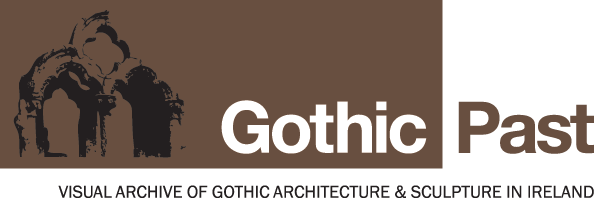Browse Items (191 total)
Sort by Title [A-Z] | [Z-A]
Kilconnell Franciscan Friary, north chancel wall, tomb niche, pinnacle, base
Tomb niche, base of pinnacle. Moulding, from top down comprises: necking roll, bell, bell, plinth.
Kilconnell Franciscan Friary, north chancel wall, tomb niche, jamb, arch and hood
Jamb arch and hood moulding of eastern tomb of chancel. Moulding of jamb from intrados comprises: chamfer, roll, hollow, roll. The hood, from extrados inward comprises hollow, and roll (could be read as ogee). This moulding is fascinating, as it appears to be emulating a the double ogee found on similar tombs in of the Limerick/Kerry group - other…
Kilconnell Franciscan Friary, north nave wall, tomb niche, jamb and arch
Jamb, arch and hood moulding of flamboyant tomb niche. Moulding of jamb and arch from intrados comprises: ogee, quadrant, hollow chamfer, ogee. The hood, from extrados, comprises: quadrant, hollow chamfer, right-angled rebate, ogee. Ogees often occur in conjunction with this kind of elaborate flame like tracery, as at St. Nicholas, Galway.
Clontuskert Augustinian Priory, stone store, mullion fragment
Mullion, loose in stone store, only one side of the mullion has elaborate mouldings, the other side is simply chamfered. The moulded side comprises: central fillet flanked at either side by hollow chamfer, spike, hollow chamfer.
Clontuskert Augustinian Priory, interior, east window, jamb
Jamb shaft running along reveal of east window. Moulding comprises, from angle: corner triple filleted roll flanked at either side by hollows and chamfers. This moulding looks Early English but is most likely fifteenth century, it looks similar to the work at Roscommon Dominican Friary, both in the jambs and in the tracery (both broken but…
Clontuskert Augustinian Priory, interior, east window, base
Base of shaft at outer face of jamb. Moulding from top down comprises: chamfered fillet, bell with keel half way down, fillet, scroll, chamfer, plinth. This base is similar in type to those at Holycross, Kilconnell, Lorrah, Strade etc.
St. Nicholas Collegiate Church, south transept, east wall, Joyce tomb, chest
Moulding of tomb chest, moulding comprises: freestanding fillet, double ogee. Ogees are unusual and often occur in conjuction with Flamoboyant tracery.
St. Nicholas Collegiate Church, south transept, east wall, Joyce tomb, base
Base of tomb niche jamb. Moulding comprises from top down: grooved roll, bell, flat surface at right angle, hollow chamfer, quadrant, flat surface, bell, flat surface at right angle, quadrant, hollow chamfer, plinth. The mouldings here are unusual, the two lower elements protrude from the bell as two square blocks with mouldings at their front…
Kilmacduagh Cathedral, south exterior wall, door, jamb, arch and hood
South door jamb, arch and hood moulding. Jamb and arch moulding from intrados comprises: hollow chamfer, quadrant, hollow chamfer, right-angled rebate, hollow chamfer. The hood, from extrados comprises: frontal fillet, hollow chamfer, right-angled rebate, hollow chamfer.
Dunmore Augustinian Friary, exterior west wall, door, capital frieze
Capital frieze running the length of the splayed door jamb. Moulding comprises, from centre: central frontal roll-and-fillet flanked above and below by fillet, hollow, and scroll.
Dunmore Augustinian Friary, exterior west wall, door, hood
Hood moulding of door. From extrados, moulding comprises frontal fillet flanked by quadrants, and at inner face, by a fillet, hollow and roll.
Ross Errilly Franciscan Friary, west exerior wall, door, jamb, arch and hood
West door, moulding from intrados comprises: hollow chamfer, quadrant, hollow chamfer. The hood from extrados in comprises: frontal fillet, hollow chamfer, hollow chamfer. The jamb and arch moulding here is particularly close to that at Tuam, in the south door of the fourteenth-century choir. Although the hood mouldings are different, the manner in…
Tuam Cathedral, fourteenth-century choir, interior south wall, sedilia, jamb and hood
Door jamb and arch moulding, there is no hood included in this drawing because the hood exactly replicates the jamb. Moulding from intrados comprises: hollow, roll-and-fillet, hollow, roll-and-fillet, hollow.
Tuam Cathedral, fourteenth-century choir, interior south wall, sedilia, jamb
Sedilia jamb, moulding from intrados comprises: (replica section) quirk, mitre, hollow, mitre, quirk, flat surface, roll, flat surface, quirk, keel, hollow, keel, quirk, flat surface, roll, flat surface, quirk, mitre, hollow, mitre, hollow, flat surface. The rolls here are very full and should be read as engaged shafts.
Tuam Cathedral, fourteenth-century choir, interior south wall, sedilia, mullion
Mullion of sedilia, moulding comprises: frontal roll-and-fillet flanked at either side by roll and small hollow chamfer. Mullion is square at rear.
Tuam Cathedral, fourteenth-century choir, interior south wall, sedilia, base
Sedilia base, moulding from top down comprises roll, hollow, roll-and fillet, hollow, fillet, roll. The middle roll-and-fillet forms a water-holding element.
Tuam Cathedral, fourteenth-century choir, interior south wall, sedilia, capital
Sedilia capital, moulding from top down comprises: roll-and-fillet, hollow, roll, hollow, fillet, bell, chamfered fillet as necking roll. An unusual capital, with small mouldings crammed at top and a very long bell - indicative of its early fourteenth-century date.
Athenry Dominican Priory, south nave wall, niche, base
Base of middle niche in south wall of nave. Moulding is broken, but what remains, from top down, comprises: water-holding element, roll with two fillets, chamfer, plinth.
Athenry Dominican Friary, south nave wall, statue corbel
Statue corbel at south side of nave, moulding from top down comprises: abacus, quadrant, flat surface, quadrant, fillet, hollow chamfer, fillet, bell, scroll, fillet, flat surface, quadrant, quarter roll (upside-down scroll), fillet, bell, necking roll.
Athenry Dominican Priory, south aisle, north wall, wall arcade, mullion
Mullion of wall arcade, moulding comprises: frontal fillet flanked at either side by flat surface, fillet, hollow.




















